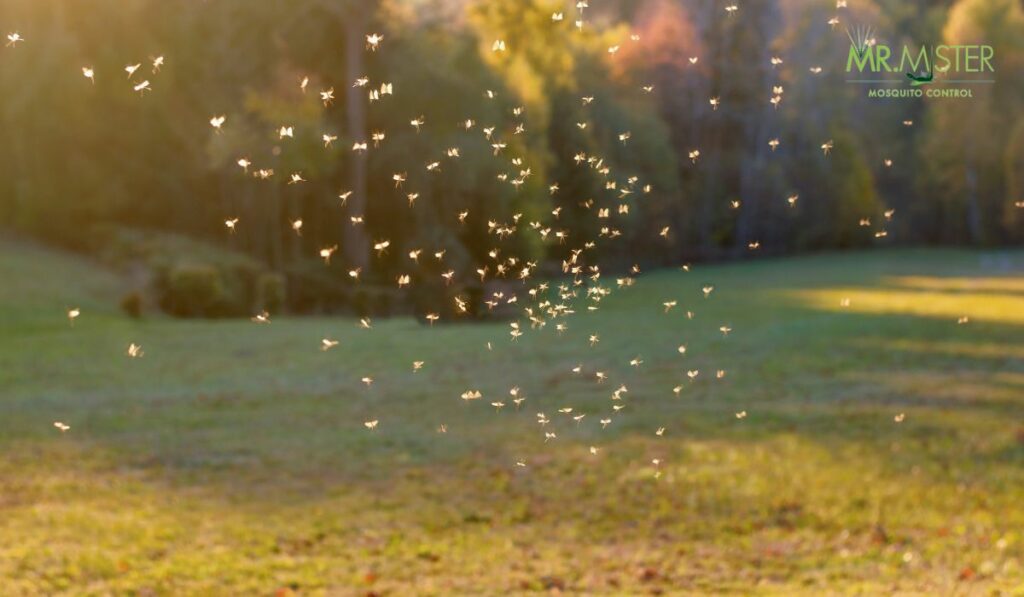Why We Aim To Create A Mosquito Free Community
Mosquitoes are not only annoying pests that can ruin outdoor activities; they also carry dangerous diseases such as malaria, dengue fever, Zika virus, and West Nile virus.
To ensure the health & well-being of our community, it is essential to create a mosquito-free environment.
This article will explore why we strive to eliminate mosquitoes and the benefits of a mosquito-free community.
Disease Prevention
Mosquitoes are known vectors for various diseases that can have serious health consequences.
Creating a mosquito-free community reduces the risk of disease transmission and protects ourselves and our loved ones from illnesses such as malaria, dengue, and Zika.
Prevention is critical for mosquito-borne diseases, and eliminating mosquito breeding grounds and reducing their population is crucial in safeguarding public health.
Improved Quality of Life
Living in a mosquito-free community significantly improves the quality of life for residents.
Mosquitoes can make outdoor activities unpleasant and disrupt peaceful evenings in our yards.
Minimizing mosquito populations allows us to enjoy our outdoor spaces without constant swatting and itching.
It will enable us to fully utilize parks, playgrounds, and recreational areas fully, enhancing our overall well-being and enjoyment of outdoor living.
Environmental Preservation
Creating a mosquito-free community involves implementing environmentally friendly methods to control mosquito populations.
Focusing on preventive measures and targeted interventions reduces the reliance on chemical insecticides that can harm beneficial insects and disrupt ecosystems.
By adopting sustainable and eco-friendly mosquito control practices, we promote the preservation of our environment and contribute to a healthier ecosystem.
Economic Benefits
A mosquito-free community brings economic benefits as well.
Mosquito-borne diseases can significantly impact local economies through increased healthcare costs, loss of productivity, and decreased tourism.
Proactively addressing mosquito control can mitigate these economic burdens and create a more favorable environment for businesses, residents, and visitors.
Protection for Vulnerable Populations
Specific populations, such as infants, pregnant women, and the elderly, are more susceptible to the health risks associated with mosquito-borne diseases.
By striving to create a mosquito-free community, we provide extra protection for these vulnerable groups.
It demonstrates our commitment to the well-being of all community members and ensures a safer environment for everyone, regardless of health status.
Conclusion
In conclusion, creating a mosquito-free community is worthwhile and offers numerous benefits.
By focusing on disease prevention, improving quality of life, preserving the environment, reaping economic advantages, and protecting vulnerable populations, we can cultivate a healthier and more enjoyable living environment for everyone.
It requires collective efforts, including community education, mosquito control initiatives, and responsible environmental practices.
Let us work together to eliminate mosquitoes and create a safer, healthier, & more vibrant community for all.
Frequently Asked Questions (FAQ)
Q1. What diseases do mosquitoes transmit?
Mosquitoes can transfer diseases such as malaria, dengue fever, Zika virus, West Nile virus, chikungunya, and yellow fever, among others.
Q2. How can I protect myself from mosquito bites?
Protect yourself from mosquito bites, wear long-sleeved clothing, use mosquito repellents, and install screens on doors and windows. It is also important to eliminate standing water where mosquitoes breed.
Q3. How do mosquitoes breed, and where do they lay their eggs?
Mosquitoes breed in stagnant water. Female mosquitoes lay their ovum on the surface of standing water, such as ponds, puddles, and containers.
Q4. Can mosquitoes be controlled without the use of chemicals?
Yes, mosquitoes can be controlled without relying solely on chemical insecticides. Integrated mosquito management approaches can effectively reduce mosquito populations, including source reduction, biological control, and habitat modification.
Q5. Are all mosquitoes disease carriers?
Not all mosquitoes are disease carriers. Only female mosquitoes of certain species can transmit diseases by biting infected individuals and biting healthy individuals.
Q6. How long do mosquitoes live?
The lifespan of mosquitoes varies depending on the species and environmental conditions. Adult mosquitoes can live for several weeks to a few months.
Q7. How can I eliminate mosquito breeding sites in my yard?
To eliminate mosquito reproduction sites in your yard, regularly empty or remove containers that collect water, keep gutters clean and debris-free, and ensure proper water drainage around your property.
Q8. Are mosquito control measures harmful to the environment?
Mosquito control measures can be harmful to the environment if not implemented properly. However, environmentally friendly methods are available, such as biological control using natural predators and targeted application of larvicides, which minimize environmental impact.
Q9. What can I do to prevent mosquitoes from entering my home?
Ensure all windows and doors have properly fitting screens to stop mosquitoes from entering your home. Repair or replace any damaged screens to keep mosquitoes out.
Q10. How can I contribute to creating a mosquito-free community?
You can create a mosquito-free community by eliminating standing water in your surroundings, practicing suitable personal protection measures, educating others about mosquito control, and supporting community initiatives focused on mosquito prevention and control.
Contact us today to learn more about creating a mosquito-free community and how our services can help protect your environment from mosquitoes and the diseases they carry.
* Schedule a Free Mosquito Control Consultation – 404-941-0720 *
* Guaranteed Results * 100% Biodegradable * Locally Owned







